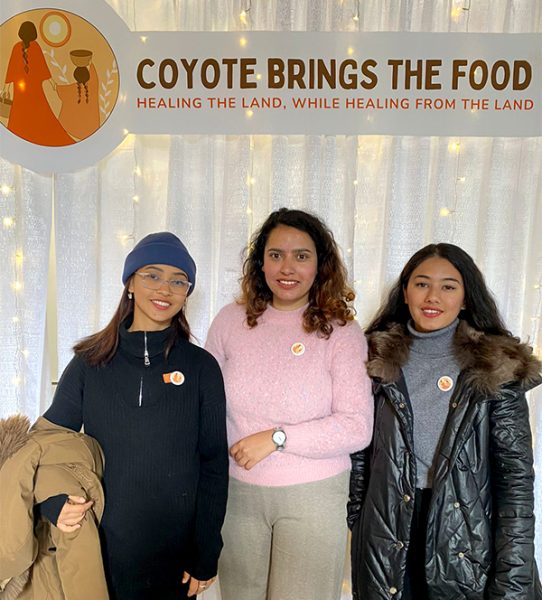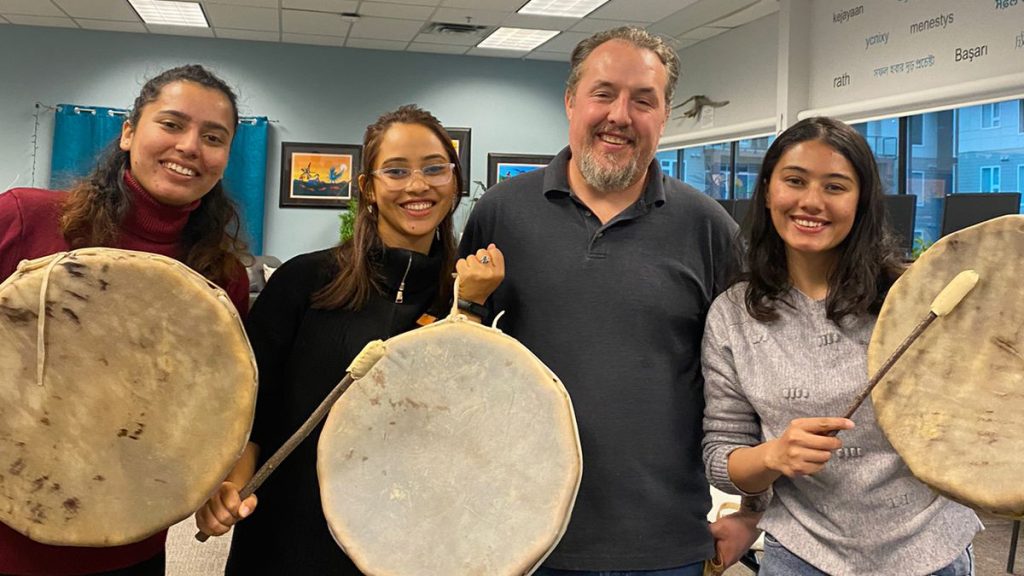By Kim Anderson
Three students are more than 10,000 km from their home country of Nepal and making a big impact in the Faculty of Education and Social Work at Thompson Rivers University (TRU) as visiting student researchers.
Yunisha Katuwal, Rupa K.C. (K.C. is her full surname) and Namuna Subedi met and became friends while pursuing their Bachelor of Social Work degrees from Kadambari College, an affiliate of Purbanchal University. The opportunity to travel to a Canadian university as a visiting student researcher came to their attention during a busy final exam period. The three were unsure about their odds of landing a highly coveted, funded, visiting research opportunity with the Global Affairs Canada International Scholarships Program. However, with preparation and encouragement from Dr. Bala Nikku, associate professor of social work at TRU (who met the trio on a visit to their campus as a guest lecturer) and Pradipta Kadambari (Kadambari College), the three friends all applied individually and hoped for the best. They assumed there would only be one successful applicant into the program, but to their great surprise, they were all chosen.
Katuwal, K.C. and Subedi quickly began preparations to make the journey to Kamloops. After a few setbacks that included visa delays and the challenging task of finding accommodations, they arrived at TRU late last February — and have been very busy ever since. As visiting student researchers from March to July 2024, they are not required to attend classes, but their schedules are full.

Rupa K.C., Namuna Subedi and Yunisha Katuwal at the two-day Knowledge Makers conference on March 11 and 12.
Between hosting guest lectures and discussions in human rights and social work classes, meeting local outreach organizations (including the Kamloops United Church, The Loop and the BC Association of Social Workers), attending various campus research colloquia and events like Knowledge Makers and IDays, and recording documentary podcast episodes, they also are co-authoring individual research papers under the supervision of Nikku.
Their research focus is related to disaster resilience, which they all have a personal connection and experience with. The three lived in Nepal when the devastating 7.8 magnitude earthquake struck in 2015. It killed approximately 9,000 people and injured more than 20,000.
“We were very lucky that we were not harmed, and our loved ones were safe and secure. The earthquake had many consequences in communities and in Nepal as a whole. Everything was devastated and people were living in tents. We were trying to cope with the environment, and we were all young when it happened,” says Subedi.
After living through such a tragic event, the three are motivated to use their social work training and education to help their community become stronger in the area of disaster resiliency.
The scholarship contributes to Nikku’s current research project funded through the New Frontiers in Research Fund (NFRF) with two central questions: How can communities better prepare, respond, and build resilience to natural hazards and disasters? In what ways can community science empower community members to build disaster resilient societies?
- Katuwal’s research topic is Indigenous Knowledge for Disaster Resilience and Management in Nepal
- K.C.’s research topic is Navigating the Risk for Construction Workers Post-Disaster in Nepal
- Namuna’s research topic is Disaster Resiliency of Women in Nepal
As a first step, Nikku has introduced them to various networking and research opportunities on projects and initiatives that he is involved with in Nepal and Canada, which they are grateful for.
“Sometimes social workers in the global south may not have access to the same opportunities as those in the western countries do. Dr. Bala is a big advocate of creating opportunities for individuals in the global south,” says Katuwal.
While sharing their own experiences and knowledge, the trio are gaining a great deal from the TRU and Kamloops community – a truly reciprocal relationship.
“That’s why social work is so interesting. Even though we are separated by borders, so many social issues like revolutions, human rights, social justice, gender and patriarchy all have similar patterns and similar ways of operating, even in different parts of the world,” says Katuwal.

The trio participated in a drum making workshop facilitated by Quanah George as part of TRU’s Indigenous Awareness Week. Left to right: Namuna Subedi, Rupa K.C., Quanah George and Yunisha Katuwal.
“This program is important to the community because international exchanges are critical for learning from each other. It aligns with TRU’s vision of global and local reach,” says Nikku.
“The students shared and presented on the culture of Nepalese communities and the history and politics of Nepal as a young republic. They brought unique perspectives, shared Indigenous Nepalese practices, and discussed how social work education can be strengthened by sharing curricula, teaching materials, field school collaboration and student and faculty exchanges.”
In meeting various social services organizations, the students are all leaving with important key takeaways, including how different services like wheelchair accessibility are managed in Canada and how it could help influence initiatives in Nepal; how social work agencies provide services in Canada including some areas like menstrual hygiene and sexual education which are considered taboo in Nepal; and broader perspectives about different areas of social work and comparing and contrasting those practices between Canada and Nepal.

